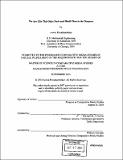We are like this only : Desis and Hindi films in the Diaspora
Author(s)
Punathambekar, Aswin, 1977-
DownloadFull printable version (5.445Mb)
Other Contributors
Massachusetts Institute of Technology. Dept. of Comparative Media Studies.
Advisor
Michael M.J. Fischer.
Terms of use
Metadata
Show full item recordAbstract
Set in Boston, U.S.A, the overarching goal of this thesis is to develop a theoretical framework and a set of analytical tools that might help us understand how Hindi films are watched in the Indian- American diaspora and what viewers, situated in particular historical, socio-political contexts, bring to bear upon their engagement with these films. In spite of the sheer number of Hindi films released each year (150-200) and the increasing importance of audiences in countries such as the U.S., we know little, if anything, about audience motivations, viewing practices and consumption patterns. Suggesting we take the familiar seriously, this project's primary goal is to serve as an inaugural act that will map key coordinates of the space that Hindi cinema and its transnational audience occupies. This research project is designed to examine viewing practices and interpretations of Hindi films among a small sample of ten Indian immigrant families drawn from two different social positions - (a) the educated, professional and affluent class (doctors, scientists, software professionals, consultants, etc.), and (b) less educated, working class (owners and employees of grocery & convenience stores, gas stations, motels & restaurants, etc.). Given the complexity of the issue of class in general, and especially its intersections with caste, religion, and other variables in the Indian context, the findings in this study will be treated not so much as a class-based comparison of reception, but instead as an attempt to situate reception in a social and historical context that is marked by profound differences in access to privilege at the local, national and transnational levels. In addition, operating with the family as the research site allows this comparative frame to investigate similarities and differences based on gender and generation. Drawing on the tradition of using ethnographic techniques to analyze media reception (in this case, participant-observation and in-depth interviews), this project hopes to establish popular culture as a crucial site for exploring how identities are communicatively constituted in the Indian diaspora. Arguing that cinema viewing constitutes one of the most culturally visible arenas of activity in the Indian diaspora, a topic that is just beginning to attract scholarly attention, this project's larger goal is to serve as a starting point for larger debates and contests over several contentious issues that reveal anxieties of Indian immigrants from diverse social positions.
Description
Thesis (S.M.)--Massachusetts Institute of Technology, Dept. of Comparative Media Studies, 2003. Includes bibliographical references (leaves 96-102).
Date issued
2003Department
Massachusetts Institute of Technology. Program in Comparative Media Studies/WritingPublisher
Massachusetts Institute of Technology
Keywords
Comparative Media Studies.